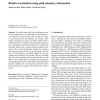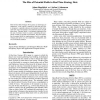1410 search results - page 191 / 282 » Mobile Robots and Intelligent Environments |
GECCO
2009
Springer
14 years 3 months ago
2009
Springer
Evolution has proven to be an effective method of training heterogeneous multi-agent teams of autonomous agents to explore unknown environments. Autonomous, heterogeneous agents ...
AAAI
2007
13 years 11 months ago
2007
The authors present TWIG, a visually grounded wordlearning system that uses its existing knowledge of vocabulary, grammar, and action schemas to help it learn the meanings of new ...
AROBOTS
2006
13 years 9 months ago
2006
All mobile bases suffer from localization errors. Previous approaches to accommodate for localization errors either use external sensors such as lasers or sonars, or use internal s...
AIIDE
2008
13 years 11 months ago
2008
Bots for Real Time Strategy (RTS) games are challenging to implement. A bot controls a number of units that may have to navigate in a partially unknown environment, while at the s...
GECCO
2007
Springer
13 years 11 months ago
2007
Springer
In autonomous agent systems, memory is an important element to handle agent behaviors appropriately. We present the analysis of memory requirements for robotic tasks including wal...


